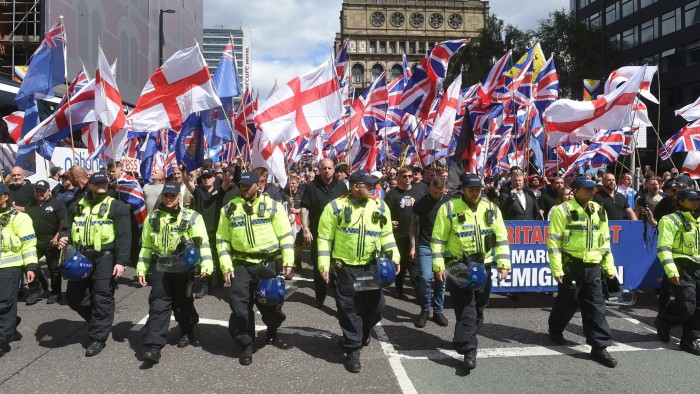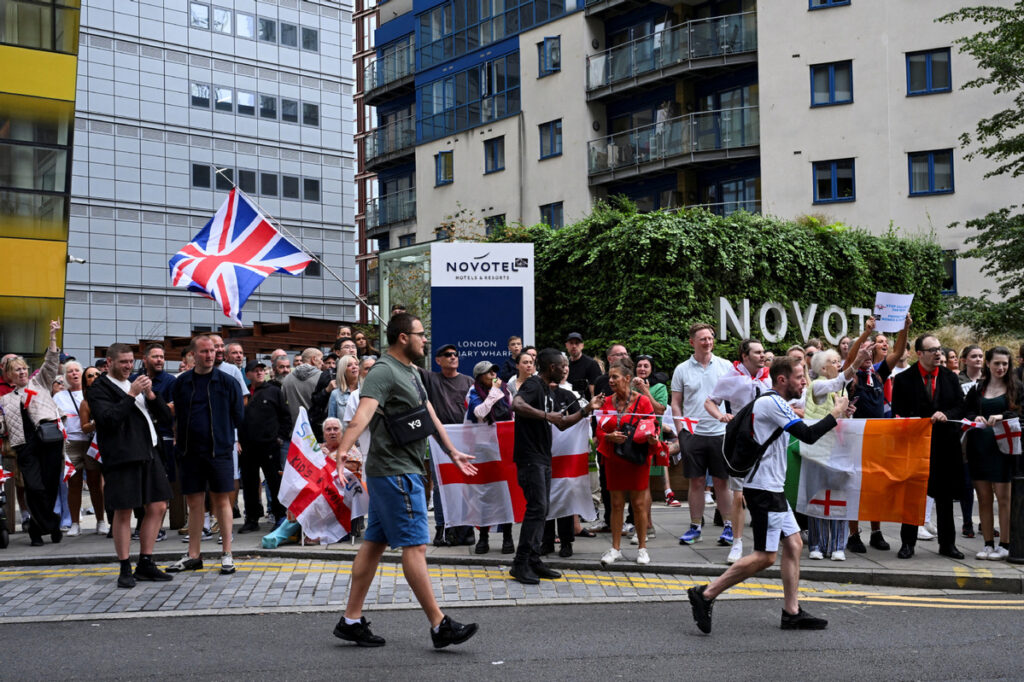
Introduction: UK Immigration Protests 2025
In recent months, the United Kingdom has witnessed a dramatic rise in immigration-related protests, particularly centred around hotels housing asylum seekers. What began as a temporary solution to shelter migrants has evolved into a national flashpoint, igniting tensions among local communities, political groups, and human rights organisations. This article delves into the root causes, major incidents, government responses, and the broader socio-political implications of these protests across England.
Background: Why Hotels Are Being Used for Asylum Seekers
The UK’s Home Office has long grappled with challenges in processing asylum applications and providing adequate housing for those awaiting decisions. With an unprecedented increase in applications and a growing backlog, the government turned to hotels as a stopgap measure.
As of mid-2025, over 380 hotels across the UK were housing nearly 50,000 asylum seekers. This practice, though necessary in the short term, sparked concerns over cost, integration, and transparency. The average cost of accommodating a migrant in a hotel is reported to be over £100 per night, prompting criticism from both fiscal conservatives and community advocates.
Despite government assurances that hotel stays are temporary, delays in asylum processing have meant many individuals remain housed in such accommodations for months, sometimes years. This prolonged visibility in residential and commercial neighbourhoods has contributed to rising tensions and, ultimately, public protests.
The Flashpoint: Major Protests at Hotel Sites

Protests began quietly in early 2024, but escalated significantly in 2025 following high-profile incidents. One of the most notable occurred in Canary Wharf, London, outside the Britannia International Hotel. Protestors, some affiliated with far-right groups, gathered to demand the removal of asylum seekers from the premises.

Other flashpoints included:
-
Epping, Essex: Violent clashes erupted as protesters confronted police, leading to arrests and injuries.
-
Manchester: Groups picketed outside local hotels, waving banners accusing migrants of being a strain on public services.
-
Thistle City Barbican, Islington: This hotel saw rival protests, with both anti-immigration demonstrators and anti-racism activists occupying the same space under heavy police surveillance.
These protests often began as local grievances but quickly attracted national and international attention due to the scale of the mobilisations and the frequency of confrontations.
The Role of Far-Right Groups and Counter-Protestors
Far-right activism in the UK has found new momentum by targeting immigration policies. Groups like Britain First and Patriotic Alternative have capitalised on the hotel accommodation issue to push anti-migrant narratives.
These organisations frequently claim that British citizens are being displaced or disadvantaged due to preferential treatment of migrants. In turn, counter-protestors—including anti-fascist groups, community organisations, and refugee rights advocates—have mobilised to confront these messages, often resulting in tense and sometimes violent standoffs.
Notably, in several cases, arrests were made not only among right-wing protestors but also among counter-demonstrators, raising questions about police neutrality and protest policing tactics.
Government Response: Fast-Track Asylum Plans and Funding Boosts
Facing mounting criticism and public unrest, the UK government unveiled a new asylum fast-track process in July 2025. Home Secretary Yvette Cooper announced the plan would aim to resolve 80% of asylum cases within 100 days, focusing on applicants from high-risk or war-torn countries.
Other measures included:
-
An additional £100 million earmarked to curb illegal migration and dismantle smuggling networks.
-
A bilateral agreement with France, promising more coordinated patrols along the English Channel.
-
New legislation making it easier to deport failed asylum seekers and restrict appeals.
These steps were met with mixed reactions. While some applauded the attempt to restore order and reduce dependency on temporary housing, others, including legal experts and humanitarian groups, warned that fast-tracking could compromise fairness and due process.
Media Influence and Spread of Misinformation
The role of media in fuelling tensions cannot be overlooked. Certain online platforms, blogs, and social media accounts have circulated misleading or exaggerated claims about asylum seekers, including false allegations of crime or misuse of public resources.
Viral content—ranging from edited videos to inflammatory headlines—has driven outrage and amplified local grievances. In one instance, a fabricated story claiming asylum seekers were receiving £500 per week in benefits circulated widely before being debunked.
The Home Office has since launched a digital counter-misinformation campaign, but trust remains low among affected communities. Misinformation continues to spread rapidly on encrypted platforms like Telegram and WhatsApp, where regulation is limited.
Impact on Local Communities and Social Cohesion
Beyond political implications, the protests have deeply affected local communities. In areas like Essex, Leeds, and Barking, residents report increased division and anxiety.
Schools, shops, and small businesses located near hotels have occasionally closed during protest days for safety reasons. Some community leaders have expressed concern that long-standing inter-ethnic harmony is being eroded due to external agitators and sustained media narratives.
On the other hand, many towns have also seen spontaneous acts of solidarity. Faith groups, local charities, and residents have welcomed asylum seekers with food drives, English language classes, and integration events—highlighting that public opinion is far from unanimous.
Legal and Human Rights Perspectives
Human rights organisations, including Amnesty International UK and Refugee Action, have raised alarms about both the protests and the government’s response. Concerns include:
-
Violation of asylum seekers’ privacy, with their hotel locations regularly leaked online.
-
Exposure to harassment and threats, particularly for women and children.
-
Lack of legal representation for those being fast-tracked or detained.
Solicitors working with migrant clients have also noted a surge in judicial reviews, challenging the legality of certain fast-track decisions and deportation notices. Legal experts argue that without adequate legal aid, many asylum seekers face unjust outcomes.
The UK’s commitment to international refugee conventions is being scrutinised by both domestic courts and global watchdogs.
Comparative Analysis: Protests Across Europe
The UK is not alone in facing backlash over immigration policy. In Poland, mass protests erupted in Warsaw, led by nationalist groups opposing EU-wide migrant relocation schemes. Similar unrest has occurred in Germany, where the concept of “remigration” (mass deportation of immigrants) has entered mainstream political debate.
In Ireland, Italy, and France, anti-immigration sentiments have been linked to housing shortages, economic instability, and rising nationalism. In each of these nations, hotels and public buildings used for migrant housing have become symbolic battlegrounds.
These patterns suggest a broader European identity crisis, wherein migration is being used as a lens through which citizens express deeper frustrations about governance, economy, and cultural change.
What This Means for UK Immigration Policy in 2025 and Beyond
The protests of 2025 mark a pivotal moment in Britain’s approach to immigration. The reliance on hotel accommodation has proven both unsustainable and politically explosive.
In response, the UK government has committed to:
-
Phasing out hotel usage by 2026 and transitioning to community-based accommodation models.
-
Investing in migrant integration and local authority partnerships.
-
Expanding detention centres, a move that has been met with legal resistance and ethical concerns.
Policy analysts warn that unless systemic reforms address not only border control but also processing efficiency, transparency, and integration, the cycle of crisis and protest will continue. The challenge lies in crafting policies that are secure, fair, and humane—without further inflaming public sentiment.
Conclusion: A Nation at Crossroads
Britain’s immigration protests in 2025 are more than just opposition to hotels or government spending—they are emblematic of a nation grappling with its identity, values, and place in a changing world.
While hotels have become hotspots, they are merely the visible face of a much deeper tension. How the UK responds now—through policy, public dialogue, and community engagement—will shape the national fabric for years to come.
In navigating this complex landscape, balance will be key. Security cannot come at the expense of compassion, and fairness must be more than just a principle on paper.
The future of immigration policy depends not just on governments, but on the voices and actions of every citizen willing to engage constructively with one of the most defining issues of our time.
We hope that you liked our blog on UK Immigration Protests 2025. You can also check more blogs on our website www.Scrollinfo.in:-
- Weekly Horoscope July 27 – August 2, 2025: Zodiac Insights, Remedies & Lucky Tips
- E-Passports Launched in India: Key Features, Benefits, How to Apply Online, Who Can Apply and More
- Laughter Chefs Season 2 Winner Revealed: Full Details, Contestants, and Surprises!
- How to Earn ₹500 Daily from Govt Schemes in India (2025 Guide)
- Pradhan Mantri Jeevan Jyoti Bima Yojana (PMJJBY)– How to Claim and Register (2025 Full Guide)
- Pradhan Mantri Suraksha Bima Yojana (PMSBY) Scheme – Eligibility and Benefits (2025 Full Guide)
- iPhone 16 vs iPhone 17 – Detailed Comparison (2025)
- Pradhan Mantri Jan Dhan Yojana (PMJDY) – Full Guide 2025
- iPhone 17 Price in India, US, UK (2025)
- Apple iPhone 17 Price Rumours: How Much The Upcoming iPhone Series May Cost In India, US, UK And Other Countries
- UPI Rules Change From August 1: From New Limits To Autopay Timings & Others—Full List
- PAN Card Loan App Alert: Unlock ₹5 Lakh Instantly With Just Your PAN Card – Here’s How
- Aadhaar Card Update 2025: Easily Correct Name-Related Spelling Mistake on Your Aadhaar Card Online – Here’s How
- Hyundai Creta 2025 ! No.1 SUV Car Launched with 5-Star Safety and 26kmpl Mileage, Beats Thar – Price Surprisingly Low with Easy EMI Options
- Stocks in News July 2025: Bajaj Finance, SBI Life, Cipla, IEX, Bajaj Finserv – Market Recap & Q1 Highlights
- Honda Civic 2025 Launched: Premium Sedan with 5-Star Safety, 28 kmpl Mileage & Luxury Features
